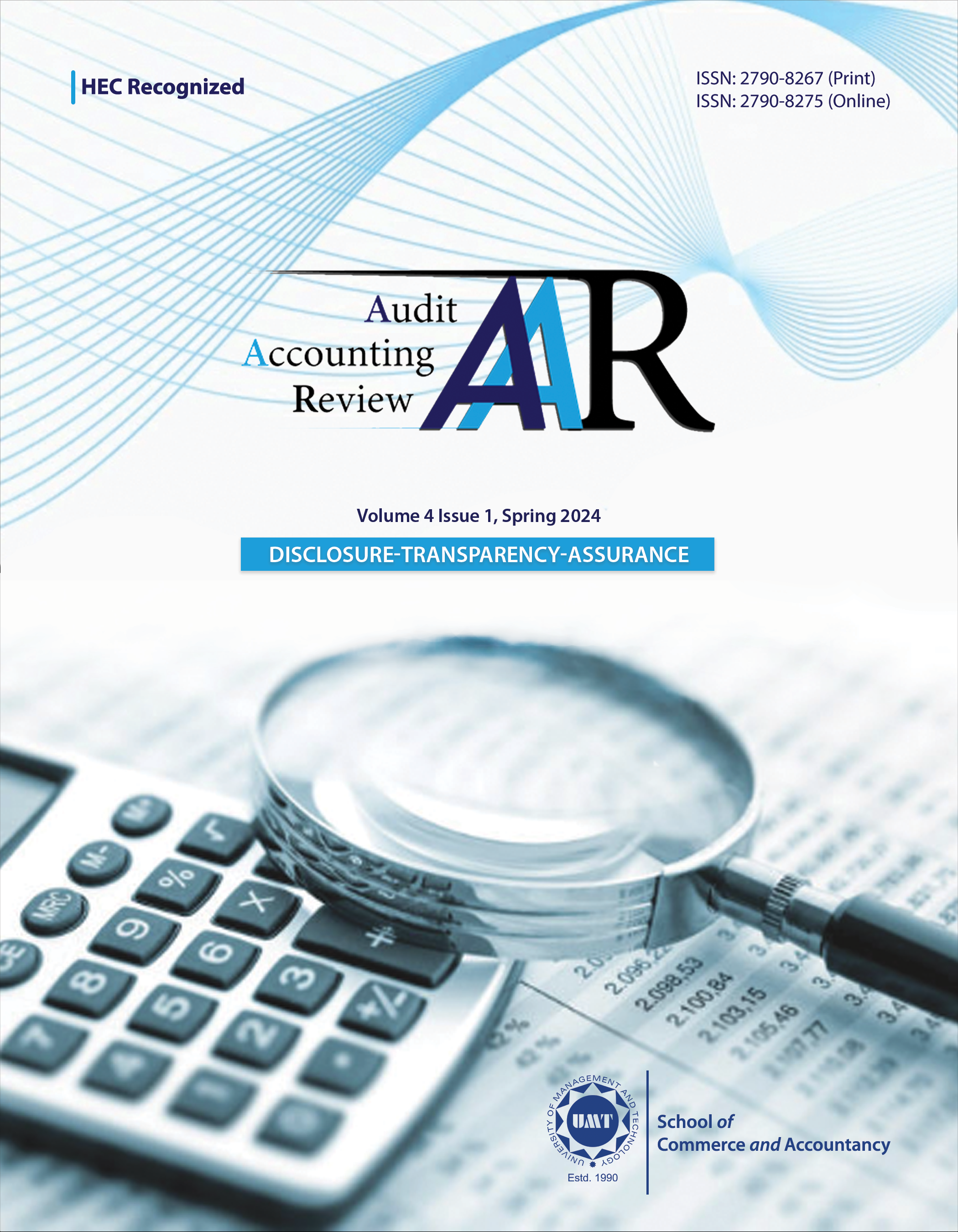Corporate Governance and Performance in Islamic and Conventional Financial Institutions: Moderating Role of Institutional Quality
Abstract
 Abstract Views: 0
Abstract Views: 0
This study explores the impact of corporate governance (CG) indicators on the financial performance of Islamic and conventional financial institutions. It also scrutinizes the impact of institutional quality (IQ) as a moderator in the nexus between corporate governance and performance. The study also examines a panel dataset of Pakistani financial institutions for the period 2006-2017. The estimation of a two-step system GMM signifies that CG significantly contributes towards improving the overall performance of financial institutions (FIs). However, the results display differential effects of CG on the performance of Islamic financial institutions (IFIs) and conventional financial institutions (CFIs). Moreover, institutional quality (IQ) significantly moderates and shapes the impact of CG on the performance of both types of FIs. Hence, institutional quality is an important element in strengthening the contributions of CG in increasing the performance of FIs. The study provides important suggestions to policymakers to improve the quality of institutions by implementing the rule of law and controlling corruption. This may enhance the effectiveness of CG and consequently institutional performance.
Downloads
References
Abdullah, M. I., Sarfraz, M., Qun, W., & Chaudhary, M. (2019). Ownership concentration impact on institution financial performance. Log Forum, 15(1), 107–118. https://doi.org/10.17270/J.LOG.2019.317
Arellano, M., & Bond, S. (1991). Some tests of specification for panel data: Monte Carlo evidence and an application to employment equations. The Review of Economic Studies, 58(2), 277–297. https://doi.org/10.2307/2297968
Arif, K., & Syed, N. (2015). Impact of corporate governance on performance of an institution: A comparison between commercial banks and financial services companies of Pakistan. European Journal of Business and Management, 7(10), 54–60.
Arslan, M., & Alqatan, A. (2020). Role of institutions in shaping corporate governance system: Evidence from emerging economy. Heliyon, 6(3), Article e3520. https://doi.org/10.1016/j.heliyon.2020.e03520
Arslan, M., Abidin, S., Alqatan, D., & Roudaki, J. (2019). Corporate governance in extreme institutional environment: Evidence from emerging economy. Corporate Ownership & Control, 17(1), 211–235. http://doi.org/10.22495/cocv17i1siart5
Aslam, E., Haron, R., & Ahmad, S. (2021). A comparative analysis of the performance of Islamic and conventional banks: Does corporate governance matter? International Journal of Business Excellence, 24(1), 53–67. https://doi.org/10.1504/IJBEX.2021.115371
Aslam, E., Haron, R., & Tahir, M. N. (2019). How director remuneration impacts firm performance: An empirical analysis of executive director remuneration in Pakistan. Borsa Istanbul Review, 19(2), 186–196. https://doi.org/10.1016/j.bir.2019.01.003
Barton, D., Coombes, P., & Wong, S. Y. (2004). Asia’s governance challenge. McKinsey Quarterly, 2, 54–61.
Basel. (2015, June 28). 85th annual report: 1April 2014–31 March-2015. Banks for International Settlement. https://www.bis.org/publ/arpdf/ar2015e.pdf
Basha, M., Reddy, K., Mubeen, S., Raju, K. H. H., & Jalaja, V. (2023). Does the performance of banking sector promote economic growth? A time series analysis. International Journal of Professional Business Review, 8(6), 1–10. https://doi.org/10.26668/businessreview/2023.v8i6.2128
Bashir, U., Fatima, U., Sohail, S., Rasul, F., & Mehboob, R. (2018). Internal corporate governance and financial performance nexus: A case of banks of Pakistan. Journal of Finance and Accounting, 6(1), 11–17. https://doi.org/10.11648/j.jfa.20180601.12
Bekele, D. T., & Degu, A. A. (2023). The effect of financial sector development on economic growth of selected sub‐Saharan Africa countries. International Journal of Finance & Economics, 28(3), 2834–2842. https://doi.org/10.1002/ijfe.2566
Bhagat, S., & Bolton, B. (2019). Corporate governance and institution performance: The sequel. Journal of Corporate Finance, 58, 142–168. https://doi.org/10.1016/j.jcorpfin.2019.04.006
Blundell, R., & Bon, S. (1998). Initial conditions and moment restrictions in dynamic panel data models. Journal of Econometrics, 87, 115–143.
Boachie, C. (2023). Corporate governance and financial performance of banks in Ghana: The moderating role of ownership structure. International Journal of Emerging Markets, 18(3), 607–632. https://doi.org/10.1108/IJOEM-09-2020-1146
Cerasi, V., Deininger, S. M., Gambacorta, L., & Oliviero, T. (2020). How post-crisis regulation has affected bank CEO compensation. Journal of International Money and Finance, 104, Article e102153. https://doi.org/10.1016/j.jimonfin.2020.102153
Cornett, M. M., McNutt, J. J., & Tehranian, H. (2009). The financial crisis: Did corporate governance affect the performance of publicly-traded US bank holding companies? Social Science Research Network. https://dx.doi.org/10.2139/ssrn.1476969
Donaldson, L., & Davis, J. H. (1991). Stewardship theory or agency theory: CEO governance and shareholder returns. Australian Journal of Management, 16(1), 49–64. https://doi.org/10.1177/031289629101600103
Fahlenbrach, R., & Stulz, R.M., (2011). Bank CEO incentives and the credit crisis. Journal of Financial Economics, 99(1), 11–26. https://doi.org/10.1016/j.jfineco.2010.08.010
Fatma, H. B., & Chouaibi, J. (2023). Corporate governance and firm value: A study on European financial institutions. International Journal of Productivity and Performance Management, 72(5), 1392–1418. https://doi.org/10.1108/IJPPM-05-2021-0306
Finance Division Government of Pakistan. (2020). Pakistan Economic Survey 2019-2020. Economic Advisor’s Wing, Finance Division Government of Pakistan, Islamabad. https://www.finance.gov.pk/survey/chapter_20/PES_2019_20.pdf
Gafoor, C. A., Mariappan, V., & Thyagarajan, S. (2018). Board characteristics and bank performance in India. IIMB Management Review, 30(2), 160–167.
Galal, M. (2017). Corporate governance and banks' performance: Evidence from Egypt. Asian Economic and Financial Review, 7(12), 1326–1343 https://doi.org/10.18488/journal.aefr.2017.712.1326.1343
Guerrero-Villegas, J., Giráldez-Puig, P., Sánchez, L. P.-C., & Hurtado-González, J. M. (2018). Ownership concentration and firm performance: The moderating effect of the monitoring and provision of resources board roles. Spanish Journal of Finance and Accounting/Revista Española de Financiación y Contabilidad, 47(4), 464–484. https://doi.org/10.1080/02102412.2018.1449722
Haider, N., Khan, N., & Iqbal, N. (2015). Impact of corporate governance on institution financial performance in islamic financial institutions. International Letters of Social and Humanistic Sciences, 51, 106–110.
Haini, H. (2019). Examining the relationship between finance, institutions and economic growth: Evidence from the ASEAN economies. Economic Change and Restructuring, 53, 519–542. https://doi.org/10.1007/s10644-019-09257-5
Hansen, L. (1982). Large sample properties of generalized method of moments estimators. Econometrica, 50(3), 1029–1054. https://doi.org/10.2307/1912775
Haris, M., Yao, H., Tariq, G., Javaid, H. M., & Ain, Q. U. (2019). Corporate governance, political connections, and bank performance. International Journal of Financial Studies, 7(4), Article e62. https://doi.org/10.3390/ijfs7040062
Himaj, S. (2014). Corporate governance in banks and its impact on risk and performance review of literature on the selected governance mechanisms. Journal of Central Banking Theory and Practice, 3(3), 53–85. https://doi.org/10.2478/jcbtp-2014-0015
Inam, H. & Mukhtar, A. (2014). Corporate governance and its impact on performance of banking sector in Pakistan. International Journal of Information, Business and Management, 6(3), 106–117.
Jarrett, U., Mohaddes, K., & Mohtadi, H. (2019). Oil price volatility, financial institutions and economic growth. Energy Policy, 126, 131–144. https://doi.org/10.1016/j.enpol.2018.10.068
Jensen, M. C., & William H. M. (1976). Theory of the institution: Managerial behavior, agency costs and ownership structure. Journal of Financial Economics, 3, 305–60. http://dx.doi.org/10.2139/ssrn.94043
Khan, M. A., Kong, D., Xiang, J., & Zhang, J. (2020). Impact of institutional quality on financial development: Cross-country evidence based on emerging and growth-leading economies. Emerging Markets Finance and Trade, 56(15), 3829–3845. https://doi.org/10.1080/1540496X.2019.1588725
Levine, R. (1997). Financial development and economic growth: Views and agenda. Journal of Economic Literature, 35(2), 688–726. https://www.jstor.org/stable/2729790
Lewis, M. K. (2005). Islamic corporate governance. Review of Islamic Economics, 9(1), 5–29. https://doi.org/10.4337/9781783479825.00021
Molla, M. I., Islam, M. S., & Rahaman, M. K. B. (2023). Corporate governance structure and bank performance: Evidence from an emerging economy. Journal of Economic and Administrative Sciences, 39(3), 730–746. https://doi.org/10.1108/JEAS-05-2021-0083
Mollah, S., & Zaman, M. (2015). Shari’ah supervision, corporate governance and performance: Conventional vs. Islamic banks. Journal of Banking & Finance, 58, 418–435. https://doi.org/10.1016/j.jbankfin.2015.04.030
Mollah, S., Hassan, M. K., Al Farooque, O., & Mobarek, A. (2017). The governance, risk-taking, and performance of Islamic banks. Journal of Financial Services Research, 51(2), 195–221. https://doi.org/10.1007/s10693-016-0245-2
Nawaz, T. (2019). Exploring the nexus between human capital, corporate governance and performance: Evidence from Islamic Banks. Journal of Business Ethics, 157(2), 567–587. https://doi.org/10.1007/s10258-019-00171-2
Nawaz, T., & Ohlrogge, O. (2023). Clarifying the impact of corporate governance and intellectual capital on financial performance: A longitudinal study of Deutsche Bank (1957–2019). International Journal of Finance & Economics, 28(4), 3808–3823. https://doi.org/10.1002/ijfe.2620
Nosheen., & Rashid, R. (2020). Financial soundness of single versus dual banking system: explaining the role of Islamic banks. Portuguese Economic Journal, 20(1), 99–127. https://doi.org/10.11648/j.ijafrm.20180303.11
Organisation for Economic Co-operation and Development. (2004). OECD principles of corporate governance. Organization for Economic Co-Operation and Development. https://www.oecd.org/corporate/ca/corporategovernanceprinciples/31557724.pdf
Pfeer, J., & Gerald, R. S. (1978). Review [Review of the book The external control of organizations: A resource dependence perspective by Jeffrey Pfeffer, Gerald R. Salancik]. Harper and Row, 87(3), 757–759. https://www.jstor.org/stable/2778955
Qadorah, A. A. M., & Fadzil, F. H. B. (2018). The relationship between board size and CEO duality and institution performance: Evidence from Jordan. International Journal of Accounting, Finance and Risk Management, 3(3), 16–20. https://doi.org/10.31436/jif.v8i0.343
Rahman, A. S. A., & Haron, R. (2019). The effect of corporate governance on Islamic banking performance: A Maqasid Shari’ah index approach on Indonesian Islamic banks. Journal of Islamic Finance, 8, 1–18. https://doi.org/10.1108/JIABR-12-2021-0317
Rashid, A., & Intartaglia, M. (2017). Financial development–does it lessen poverty? Journal of Economic Studies, 44(1), 69–84. https://doi.org/10.1108/JES-06-2015-0111
Rashid, A., Akmal, M., & Shah, S. M. A. R. (2024). Corporate governance and risk management in Islamic and convectional financial institutions: Explaining the role of institutional quality. Journal of Islamic Accounting and Business Research, 15(3), 466–498. https://doi.org/10.1108/JIABR-12-2021-0317
Razali, M. W. M., Yee, N. S., Hwang, J. Y. T., Tak, A. H. B., & Kadri, N. (2018). Directors’ remuneration and institution’s performance: A study on Malaysian listed institution under consumer product industry. International Business Research, 11(5), 102–109. https://doi.org/10.5539/ibr.v11n5p102
Rehmans, R., & Mangla, I. U. (2010). Corporate governance and performance of financial institutions in Pakistan: A comparison between conventional and Islamic banks in Pakistan. The Pakistan Development Review, 49(4), 461–475.
Salti, N. (2015). Income inequality and the composition of public debt. Journal of Economic Studies, 42(5), 821–837. https://doi.org/10.1108/JES-01-2014-0015
Securities and Exchange Commission of Pakistan (SECP). (2021). Annual Report-2021. https://www.secp.gov.pk/document/annual-report-2021/?ind=1653133183790&filename=Annual-Report-FY2020-21.pdf&wpdmdl=44660&refresh=667e4f823ee331719553922#page=108.11
Shah, M. A. R., Rashid, A., & Farooq, M. U. (2018). An evaluation of the distinguish model of Islamic Banks: Historical development and unique characteristics. Zia-e-Tahqeeq, 8(16), 5–21.
Sheikh, N. A., & Kareem, S. (2015). The impact of board structure, ownership concentration, and ceo remuneration on the performance of Islamic commercial banks in Pakistan. Pakistan Journal of Islamic Research, 15, 49–59.
State Bank of Pakistan. (2023). Islamic banking bulletin. https://www.sbp.org.pk/ibd/bulletin/2023/Islamic%20Banking%20Bulletin-March%202023.pdf
Tashkandi, A. A. (2023). Shariah supervision and corporate governance effects on Islamic banks’ performance: Evidence from the GCC countries. Journal of Business and Socio-economic Development, 3(3), 253–264. https://doi.org/10.1108/JBSED-02-2022-0024
The Insurance Association of Pakistan. (2019). http://www.iap.net.pk/Displaypage.aspx?ID=1
Trinh, T. H., & Thao, T. T. (2015). The impact of corporate governance on financial risk in vietnamese commercial banks. International Journal of Economics and Finance, 7(7), 123–130. https://doi.org/10.5539/ijef.v7n7p123
Wasike, C. N. (2017). Financial regulation as moderating, influence of corporate governance, institutional quality, human capital and firm size on financial institutions performance in Kenya. Journal of Administrative and Business Studies, 3(6), 292–304. https://doi.org/10.20474/jabs-3.6.4
Winful, E. C., Sarpong, D., & Agyei-Ntiamoah, J. (2016). Relationship between institutional quality and stock market performance: Evidence from emerging economies. African Journal of Business Management, 10(19), 469–484. https://doi.org/10.5897/AJBM2016.8153.
Yusoff, W. F. W., & Alhaji, I. A. (2012). Corporate governance and institution performance of listed companies in Malaysia. Trends and Development in Management Studies, 1(1), 43–65.
Zaman, R., Arslan, M., Sohail, M., & Malik, R. K. (2014). The impact of monetary policy on financial performance: Evidence from banking sector of Pakistan. Journal of basic and Applied Scientific Research, 4(8), 119–124.
Zeineb, G. B., & Mensi, S. (2018). Corporate governance, risk and efficiency: Evidence from GCC Islamic banks. Managerial Finance, 44(5), 551–569. https://doi.org/10.1108/MF-05-2017-0186
Copyright (c) 2024 Muhammad Akmal, Abdul Rashid, Syed Muhammad Abdul Rehman Shah, Jamshid ur Rehman

This work is licensed under a Creative Commons Attribution 4.0 International License.
Authors retain copyright and grant the journal right of first publication with the work simultaneously licensed under a Creative Commons Attribution (CC-BY) 4.0 License that allows others to share the work with an acknowledgement of the work’s authorship and initial publication in this journal.







